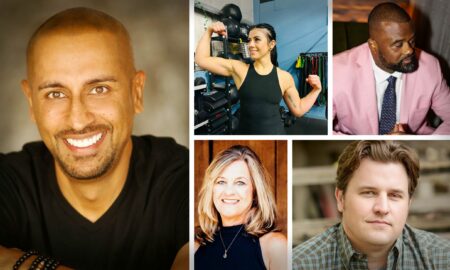

Today we’d like to introduce you to Megan Delp.
Hi Megan, so excited to have you on the platform. So before we get into questions about your work-life, maybe you can bring our readers up to speed on your story and how you got to where you are today?
I’ve been a mental health therapist for five years now, and have been so frustrated by my clients’ stories about struggling workplaces that I decided I wanted to do something about it! Companies have had to change so much since the start of the pandemic, and that has only increased stress for everyone. As I pursue my doctoral degree in Organizational Psychology, I’m combining what I’m learning with what I have already mastered through my therapy practice, and providing mental health education to companies in a way that is functional, sustainable, and sometimes even fun. Creating a mentally strong organization can only benefit the employees and leadership! Initially, I was requested for consulting work and provided presentations to awesome organizations like the Smithsonian, John Hopkins University, and DXL. I’m hopeful that I can help more organizations, both in Austin and throughout the country build more mentally strong company cultures.
Can you talk to us a bit about the challenges and lessons you’ve learned along the way. Looking back, would you say it’s been easy or smooth in retrospect?
As with most things in the mental health world, it is a hard battle to defeat the stigma around this topic. Many people feel uncomfortable talking about mental health because it can feel quite vulnerable to do so – even more so in the workplace, where it might be considered “unprofessional” to discuss topics like depression or anxiety. It’s been hard to get companies to understand the value of creating a space for mental health in their organization and what that would even look like. At its core, mental health in the workplace means more open and collaborative communication about what is realistic for each employee so that the company can plan accordingly and engage in additional training for employees who need it. I believe over time, this topic will feel less scary, especially as companies start to see the positive changes through having mental health be part of the company culture.
As you know, we’re big fans of Work Destressed. For our readers who might not be as familiar what can you tell them about the brand?
I created Work Destressed because for almost every human adult, work is a major part of their day-to-day lives and I believe we should try to make it as joyful as possible. Most of my therapy clients report that the work itself is not why they stay at a company – it’s a good manager, fun colleagues, a collaborative work environment. Humans are social beings, so work can be a powerful way to build those social connections (remote or in-person)! Through Work Destressed, I help companies first identify their needs in the mental health space. Then we lay the groundwork for building a more functional process based around the needs of their employees. I specialize in creating collaboration across the generations at work (think, helping a Boomer and a Millennial communicate in a way that works for both of them). So often the story between generations is that the differences are so extreme they get in the way. I see it as each generation having their own unique superpowers at work – the Baby Boomer is dedicated to the deep client relationships, GenXs are known for their work/life balance, Millennials hold high standards for organizational accountability, and GenZs are the most technologically competent generation so far.
In addition to utilizing everyone’s strengths, we also invest in educating leadership to speak with their employees in a way that is more motivating, understanding, or engaging. It could mean helping employees learn how to keep their mental health strong while they navigate their work/life balance. As a trauma therapist, I can also offer specialty services to companies who have experienced intense difficulties such as layoffs, the death of an employee, or even violence in the workplace. What sets me apart from other corporate mental health services is that, as an active therapist, I am continuing to learn the best ways to help people maintain their mental health, even through trauma.
At the heart of my work, I specialize in relationships as I am a Licensed Marriage & Family Therapist. While organizations are not families, they are communities built on relationships. Building healthy relationships takes the same familial tenets of respect, honesty, trust, and flexibility. Companies need thriving professional relationships in order to function.
It has been fun shifting the skills I teach my clients every day into the corporate world – the skills of mindfulness, emotion regulation, and interpersonal effectiveness can help everyone build a better worklife.
Is there anyone you’d like to thank or give credit to?
The first company I worked for as a contract consultant, BurnAlong, taught me so much about myself! I thought I hated public speaking, but after the good people at BurnAlong encouraged me (A LOT) I really embraced it and learned that it can be pretty fun. I truly do love talking about mental health, and I wouldn’t have ever realized my full potential without their help. Shoutout to Mark and Ricky in particular – they really believed in me and encouraged me to share my mental health message.
Contact Info:
- Website: www.workdestressed.com
- Instagram: @workdestressed
- Other: https://www.meetup.com/mentalhealthatwork/

















